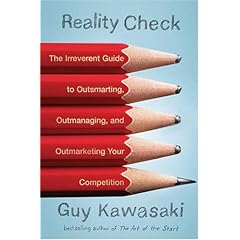Why You Should Buy Guy Kawasaki's Latest Book

In late 1993 or early 1994 I saw a PrintShop created flyer on a library bulletin board announcing that Guy Kawasaki was coming to a local senior citizen center in Torrance, California. I had seen Kawasaki speak at a couple of conferences and have given away countless copies of his groundbreaking book, Selling the Dream. What the hell could one the world's best business evangelists be doing on a Tuesday night in Torrance?
I had to go and find out.
Guy arrived to speak to the local Macintosh User Group in a dingy multipurpose room. Although he had led marketing for the Macintosh launch at Apple Computer, Kawasaki, Steve Jobs and Steve Wozniak were out in the wilderness during those years.
I remember Guy starting his presentation by saying, "I'm here to demonstrate a new program called Claris Em@iler. I know that you're an intelligent audience so I intend to demonstrate each and every feature of the software." Kawasaki was so damned entertaining that nobody seemed to mind missing an episode of Chicago Hope.
At the end of his killer demo, Kawasaki said, "Claris Em@iler will ship in about six months and cost around $100. I will sell it to you tonight for $20 (or $40 - I can't remember). I need to leave for LAX in 8 minutes at which point the sale offer ends forever. I take checks and cash."
You had to duck to avoid injury from the tsunami of money flying towards him. I worked as a consultant and author for Claris at the time and knew I could get a copy of the software for free, but that didn't make me immune to his salesmanship and I too surrendered the cash. I have never seen a more effective display of sales and marketing.

I used Claris Em@iler everyday for eight or ten years.
When I taught grant writing, Kawasaki's Selling the Dream was an invaluable text. I've enjoyed many of his other books as well.

Tonight, I went to the local bookstore to shop for holiday and birthday presents and found Guy Kawasaki's brand new book, Reality Check: The Irreverent Guide to Outsmarting, Outmanaging, and Outmarketing Your Competition. The book is fantastic - like a witty how-to manual for life.
I was going to give the book to my spousal equivalent as a birthday present, but it's far too practical, like a gift of socks or can-opener. No one wants a practical gift for their birthday!
Before one of my handful of loyal readers accuses me of hypocrisy, allow me to explain myself. Sure, I have been an outspoken critic of school leaders seeking wisdom from schlocky pop business tomes. Guy Kawasaki's work is fundamentally different from books by Thomas Friedman or Daniel Pink.
I wrote
What business gurus like Don Tapscott, Daniel Pink, Malcolm Gladwell, Stephen Covey, Tony Robbins have in common is that none of them actually ever ran a business prior to hitting the bestseller list offering business advice to others. Most of them have never been the night manager of a Seven-Eleven let alone launched or managed an innovative business venture.
They are fancy talkers.
That is their skill. Several are evangelicals. Faith or pseudoscience, along with a dose of prosperity theology, is used to advance their arguments.
Their audience is adults who dream of being rich or increase their personal productivity. Neither goal is analogous to the education of children.
Kawasaki does not write about that which he does not know and cannot do. He has launched startups, blogged, given speeches, created web sites, written books and successfully marketed products. Perhaps his most successful product is Guy Kawasaki. His books are full of common sense advice, inspirational stories and practical strategies and tactics for realizing one's potential. Kawasaki is self-deprecating, hilarious and a good guy.
He doesn't resort to junk science or fear to get our attention.
Although the book includes strategies for inventing a product, marketing, evangelism, securing financing, getting a job in Silicon Valley, hiring and firing, it also offers practical lessons in blogging, public relations, public speaking, effective panel discussions, making compelling presentations, email etiquette and much more.
Guy Kawasaki's books are not get-rich-quick schemes. They inspire us achieve our dreams and be our best. That's why the new book is perfect for CEOs, school administrators, classroom teachers and community organizers. I'll also be buying a copy for an ambitious 17 year-old friend of mine and using it as a course text in the near future.
Reality Check: The Irreverent Guide to Outsmarting, Outmanaging, and Outmarketing Your Competition. is like an anthology of Kawasaki's greatest hits. It's a quick read that you will want to consult for years to come.
Labels: blogging, books, education leadership, Educational leadership, evangelism, Guy Kawasaki, marketing


